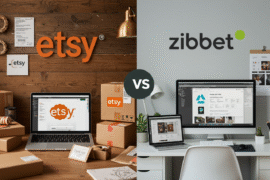This article may contain references to products or services from one or more of our advertisers or partners. We may receive compensation when you click on links to those products or services. Nonetheless, our opinions are our own.
The information presented in this article is accurate to the best of our knowledge at the time of publication. However, information is subject to change, and no guarantees are made about the continued accuracy or completeness of this content after its publication date.

Updated by Albert Fang
Are you passionate about finance and want to share your knowledge with others while earning money? Starting a finance blog can be a great way to do just that. But where do you begin? In this ultimate guide, we will take you through all the steps needed to launch your finance blog successfully. From identifying your niche and setting up your blog to designing it and building content, we will cover it all. We will also discuss how to build credibility and reputation for your blog, promote it through SEO and social media, and monetize it through affiliate marketing and sponsored content. So, whether you are an aspiring finance blogger or looking to take your existing blog to the next level, this guide is for you!
Identifying Your Finance Blog’s Focus
Identifying your finance blog’s focus is crucial for success. Understanding your target audience is essential to create relevant content. Thorough research and analysis are required to identify a profitable niche. A focused finance blog attracts more affiliate programs and product sales, laying a solid foundation for a successful online business. Choosing the right niche is the first step towards establishing your blog. This will help you attract personal finance bloggers and build a long-term, successful blog. The next step involves deciding on a blog name reflective of your niche and building a solid email list. Successful bloggers emphasize the importance of identifying different ways to make money blogging within the personal finance niche, which takes a lot of time and effort but can lead to a successful online store.
Importance of Choosing the Right Niche
Choosing the right niche for your finance blog is paramount to its success. Aligning your expertise and passion with a specific niche enhances the quality of your content, positioning you as an authority in the finance blogging sphere. Moreover, a well-chosen niche ensures that your content resonates with the target audience, leading to higher engagement. When you select a niche with high demand and low competition, you open doors to greater monetization opportunities. Remember, a well-defined niche sets the foundation for long-term blogging success, so take the time to research and analyze which niche aligns best with your expertise and audience.
Popular Niches in Finance Blogging
When delving into finance blogging, it’s essential to consider the various popular niches that attract a substantial audience and offer monetization opportunities. Personal finance, real estate, and investment advice stand out as highly sought-after niches, catering to individuals seeking sound financial guidance. Niche options like budgeting, frugal living, and side hustles have a broad appeal, addressing the financial needs of a diverse audience. Furthermore, specialized niches such as financial advice for specific demographics or financial decisions in personal relationships can be lucrative. For those looking to capitalize on affiliate marketing, tax planning, retirement strategies, and financial planning present ample opportunities. It’s crucial to analyze these niches carefully to determine the best fit for your finance blog and align your content strategy with the interests and needs of your target audience.
Setting Up Your Finance Blog
When starting a finance blog, your choice of blogging platform is crucial. It should provide the flexibility and support needed for your blog’s growth. Additionally, selecting a domain name that aligns with your niche is essential for establishing your blog’s brand identity. Reliable web hosting ensures a seamless user experience, a deciding factor in the success of your blog. As you set up your finance blog, prioritize user-friendliness and search engine optimization to attract and retain readers. Planning and executing a successful setup lays a solid foundation for your blogging journey.
Selecting an Appropriate Blogging Platform
When setting up a finance blog, it’s crucial to select the right blogging platform that aligns with your long-term goals. Popular choices like WordPress, Blogger, and Wix offer ease of use and customization options. Customizing the content management system to fit your personal finance niche is essential for a successful blog. Additionally, choosing a platform that supports display ads, affiliate marketing, and e-commerce functionalities is vital for successful monetization. Another important consideration is selecting a platform with robust security features to protect your blog and audience data. The chosen platform should offer scalability to accommodate future growth. Taking these factors into account will lay a solid foundation for your personal finance blog.
Choosing a Domain Name Reflective of Your Niche
Selecting a domain name that distinctly represents your niche is pivotal for attracting the right audience from search results. A memorable and brandable domain name is essential for long-term brand recognition and marketing endeavors. Aligning your domain name with your niche increases the likelihood of ranking higher in search engine results. Opting for a keyword-rich domain name can positively impact your search engine optimization efforts, contributing to improved online visibility. The choice of your domain name significantly shapes your blog’s online presence, highlighting the importance of a prudent selection.
Purchasing Your Domain and Web Hosting
Investing in a domain name and web hosting plan is a critical step to establish a successful finance blog. It is essential to choose a reliable web hosting service that ensures minimal downtime and optimal website performance. Selecting a web hosting plan tailored to accommodate blog traffic and storage requirements is crucial for scalability. Factors such as customer support, uptime, and security should be carefully considered when purchasing web hosting services. Additionally, choosing web hosting services offering email hosting, domain privacy, and SSL certificates enhances blog security and professionalism. This lays a solid foundation for your blog, aligning with the long-term goals of establishing a credible online presence within the personal finance niche.
Designing Your Finance Blog
Designing a finance blog involves finding the ideal WordPress theme for a visually appealing and functional design. A seamless user experience is essential for retaining visitors, with user-friendly design enhancing navigation and lowering bounce rates. Implementing a responsive design ensures the blog looks great across various devices, balancing aesthetics, functionality, and user experience. Personal finance bloggers should consider the blog name’s reflection of their niche for long-term brand recognition. Creating a solid foundation is the most important thing for money blogging success, considering different ways to monetize, including setting up an online store and building an email list. Successful bloggers emphasize the next step in securing a successful online business, investing a lot of time to build a loyal audience.
Finding the Perfect WordPress Theme
Selecting an appropriate WordPress theme that complements the niche and branding of your finance blog is crucial for visual cohesion. Ensuring that the chosen theme is responsive will guarantee a seamless user experience across various devices, including desktops, tablets, and smartphones. Customizing the WordPress theme to align with your brand’s personality and niche requirements is essential to create a unique and engaging blog. Furthermore, a well-designed WordPress theme can significantly contribute to better search engine optimization and improved user engagement. Opting for a lightweight and fast-loading WordPress theme will not only enhance user experience but also optimize blog performance, ultimately leading to higher user satisfaction and retention.
Importance of User-Friendly Design
Encouraging visitors to navigate your finance blog, user-friendly design contributes to longer session durations. By implementing intuitive navigation and clear call-to-action elements, you can improve user interaction and engagement. Lower bounce rates, a result of user-friendly design, signify a positive user experience. Additionally, ensuring accessibility in the design allows all visitors to easily consume content. Prioritizing user-friendly design fosters trust and credibility, enhancing the overall user experience of your finance blog. Remember, a well-designed blog reflects the most important thing — a solid foundation for your online presence.
Creating a Memorable Logo
In the realm of personal finance bloggers, crafting a memorable logo plays a pivotal role. It serves as a visual representation that enhances brand recognition and credibility within the personal finance niche. A well-designed logo effectively communicates the blog’s niche and values, setting the stage for establishing a solid foundation in the online business domain. Consistency in logo usage across various platforms fosters brand trust, while a unique logo distinguishes the finance blog from competitors. For personal finance bloggers aiming to make money blogging, understanding the significance of creating a professional and distinctive logo is the next step towards building a successful online presence.
Essential Pages for Your Finance Blog
Establishing credibility through essential blog pages is crucial for personal finance bloggers. Transparency and trust-building are the cornerstones of a successful blog, achieved through vital pages that offer insight into the blog’s owner and information about the personal finance niche. Well-structured pages not only lay a solid foundation for the blog but also enhance user experience, contributing to reader trust and confidence. The blog name, along with the about page, contact page, and privacy policy page, forms the core of establishing a trustworthy and credible online presence in the personal finance blogging sphere. Building a successful personal finance blog requires a solid foundation, and these essential pages are the first step toward achieving that goal.
Crafting a Compelling About Page
Crafting a compelling About page is crucial for connecting with readers. This page gives insight into the blog’s purpose and vision, establishing a personal connection. It humanizes the blog by sharing the owner’s story and expertise in the personal finance niche. A well-crafted About page sets the tone for the blog’s content and voice, laying a solid foundation for reader engagement. It’s the next step in creating a successful online business, as it shares the blog’s name and communicates its values. Personal finance bloggers understand that a compelling About page is one of the most important things for building credibility and trust with readers.
The Need for a Contact Page
A Contact page is crucial for reader interaction and feedback, serving as a platform for business inquiries and collaboration opportunities. It reflects the blog owner’s accessibility, professionalism, and commitment to building trust and credibility. Effective design of the Contact page streamlines communication with readers, enhancing user experience and credibility. A well-structured Contact page in your finance blog can set a solid foundation for establishing trust and nurturing relationships with your audience, which is a fundamental aspect of successful blogging. Including a Contact page as part of your blog’s essential pages creates a pathway for communication and engagement, ultimately contributing to the overall success of your online venture.
Understanding the Importance of a Privacy Policy Page
In the realm of personal finance bloggers, the Privacy Policy page is an essential element for every blog name. It serves as a solid foundation for demonstrating compliance with privacy regulations and communicating a commitment to user privacy. By outlining the collection, usage, and protection of user data, the Privacy Policy page fosters transparency and credibility. In the personal finance niche, building a successful online business requires much attention to this aspect. It’s one of the most important things for establishing trust with readers and fostering a connection with your email list. Understanding the importance of a Privacy Policy page is the next step towards creating a trustworthy and compliant online store.
Building Content for Your Finance Blog
Researching trending topics and current events in the personal finance niche is crucial for a personal finance blogger. Bloggers should identify their target audience’s financial needs and tailor content to address those needs effectively. Creating a content calendar helps in planning and organizing upcoming blog posts, allowing for consistent posting. Implementing search engine optimization (SEO) techniques is essential to increase visibility and attract traffic to the blog. Engaging with the audience through social media fosters interaction and feedback, nurturing a thriving online community. Encouraging comments and feedback establishes a solid foundation for building a successful personal finance blog.
Choosing Relevant Topics
When selecting topics, it’s crucial to align with your audience and niche. Keeping updated with finance news and trends is essential. Utilize keyword research and engage on social media for audience feedback. Analyze website metrics to understand resonating topics. The personal finance niche requires a solid foundation for successful blogging. It’s the most important thing for personal finance bloggers to stay relevant. Utilize different ways to engage with the audience, such as through email lists and an online store. Successful bloggers know that consistent posting and engaging content are paramount. This knowledge will help you make much money through your personal finance blog in the long run.
Importance of Consistent Posting
Maintaining a consistent posting schedule is crucial for building a loyal audience and increasing traffic to your finance blog. By providing regular updates, you can also improve your blog’s search engine rankings and visibility. Additionally, scheduling posts in advance saves time and ensures a steady flow of content. It’s important to analyze your audience’s engagement to determine the frequency and content strategy that best resonates with them. Quality should never be compromised for consistency, so finding a balance between the two is imperative. In the personal finance niche, successful bloggers understand that consistent posting lays a solid foundation for a successful blog and helps in creating a reputable online presence, leading to potential monetization opportunities.
Diversifying Content Types
To increase engagement and reach a wider audience, consider incorporating video content into your blog. You can use text-to-speech software to convert your written content into videos, making it easier for your audience to get valuable insights. Infographics are an effective way to simplify complex financial concepts and present data visually. The finance industry’s growing trend of podcasts offers a unique perspective on financial topics. Adding guest posts from industry experts can enhance your blog’s credibility and attract new readers. Experimenting with various content types is essential to keep your audience engaged and your blog fresh. Diversifying your content can be the next step towards establishing a successful personal finance blog in a competitive online space.
Building Reputation and Credibility
Establishing a strong reputation and credibility is crucial for personal finance bloggers. Collaborating with well-known figures in the personal finance niche can significantly boost your blog’s authority. Guest blogging on reputable platforms within the finance industry can also expand your reach and position you as an expert in your field. Engaging with your audience through a compelling blog name and consistent, high-quality content is the next step to building credibility. Successful bloggers in the personal finance niche often emphasize the importance of creating a solid foundation through regular interaction with readers and maintaining a professional online presence. Additionally, growing and nurturing an email list can further enhance your reputation as a trustworthy source of financial information.
Benefits of Guest Blogging
Guest blogging presents a valuable opportunity to expand your reach beyond your usual audience. By collaborating with other bloggers and experts in the personal finance niche, you can establish meaningful relationships and tap into new networks of potential readers. Additionally, contributing guest posts to reputable blogs can significantly enhance your blog’s search engine ranking, increasing its visibility and credibility within the online finance community. Through guest blogging, you have the platform to demonstrate your expertise and showcase your unique insights, reinforcing your authority in the field. Furthermore, it serves as an effective strategy for driving new traffic to your personal finance blog, ultimately contributing to its growth and success.
Collaborating with Finance Experts
Collaborating with experts in the finance niche is a surefire way to add credibility to your blog and provide valuable insights to your audience. Such collaborations can lead to increased traffic and engagement while also opening up new opportunities. Networking within the finance niche is crucial, and collaborating with finance experts is the next step in establishing a solid foundation for your personal finance blog. Successful bloggers in the personal finance niche will attest to the importance of these connections. By building relationships with experts, you can position your blog as an authority in the finance niche and attract a wider audience. The benefits of collaborating with finance experts are immense, and it’s one of the most important things you can do to grow your personal finance blog.
Promoting Your Finance Blog
Utilizing various online channels to promote your finance blog is essential for reaching a wider audience. Social media platforms serve as effective tools for sharing your valuable content and engaging with your audience. Implementing email marketing strategies can help in directly promoting your blog posts to your subscribers, driving traffic to your website. Sharing your blog posts in relevant online finance communities and forums can attract like-minded individuals who are interested in your niche. Collaborating with influencers and other personal finance bloggers can expand your reach and bring in new followers. Additionally, implementing search engine optimization (SEO) techniques can improve the visibility of your blog, making it easier for your target audience to find you amidst the sea of online content.
Understanding SEO for Finance Blogs
When it comes to optimizing your finance blog for search engines, one of the first steps is conducting thorough keyword research to identify high-potential search terms. This will help you understand what your target audience is searching for and tailor your content accordingly. Optimizing blog post titles and meta descriptions for search engines is also crucial in attracting organic traffic to your blog. Creating high-quality, finance-related content is essential for improving search engine rankings and establishing your blog’s authority in the personal finance niche. Additionally, creating internal links between finance blog posts can further enhance your SEO efforts and improve the overall visibility of your content. Regularly monitoring and analyzing your finance blog’s traffic using tools like Google Analytics can provide valuable insights into the effectiveness of your SEO strategies and areas for improvement.
Crafting a successful social media strategy for finance blogs is essential to engage and grow your audience. Tailor your social media content to resonate with the specific interests and needs of your target audience in the personal finance niche. Utilize various platforms to actively engage with your audience, fostering meaningful interactions and relationships. Leverage social media advertising to promote your finance blog’s valuable content, reaching a wider audience and driving traffic to your website. Active participation in finance-themed Twitter chats and LinkedIn groups can further solidify your presence in the community. Lastly, use social media analytics to measure the impact of your finance blog content, gaining valuable insights into what resonates with your audience and adjusting your strategy accordingly.
Monetizing Your Finance Blog
Exploring various affiliate marketing programs within the personal finance niche can be a lucrative way to monetize your blog. Offering online courses and digital products that provide valuable personal finance advice is another avenue to generate income. Display ads, like Google AdSense, can be strategically placed throughout your blog to drive revenue. Creating sponsored content opportunities with relevant finance companies is a mutually beneficial way to earn from your blog. Additionally, providing consulting services or selling financial products can contribute to your blog’s profitability. By considering these different ways of monetization, you can build a solid foundation for a successful and profitable personal finance blog.
Exploring Affiliate Marketing Opportunities
When delving into affiliate marketing opportunities for your finance blog, it’s crucial to carefully select affiliate programs that resonate with your blog’s niche and audience. Promoting financial products or services should always prioritize offering genuine value to your readers. Transparency is key, so be sure to openly disclose your affiliate relationships in all relevant finance blog content. Additionally, consider affiliate marketing as a supplementary income stream for your blog, alongside other monetization avenues. Analyzing performance through robust analytics and tracking methods is imperative to gauge the effectiveness of your affiliate marketing strategies. By evaluating the data, you can make informed decisions on the most effective ways to optimize your affiliate marketing campaigns.
Is Sponsored Content a Viable Option?
Sponsored content can be a viable option for monetizing your finance blog. It offers a revenue stream by collaborating with finance-related brands for content creation. Transparency with your audience about sponsored content relationships is essential, ensuring alignment with your blog’s values and providing exposure to new products and services in the finance niche.
Conclusion
In conclusion, creating a successful finance blog requires careful planning, consistent effort, and a focus on providing value to your readers. By identifying your blog’s niche and setting up a professional and user-friendly website, you establish a solid foundation. Building a strong reputation and credibility through guest blogging and collaborations with finance experts further enhances your blog’s authority. Effective promotion strategies, including SEO optimization and a well-executed social media strategy, help drive traffic to your blog. Finally, monetizing your finance blog through affiliate marketing and sponsored content can provide opportunities for income generation. Remember, success in finance blogging is not achieved overnight, but with dedication, strategic planning, and a commitment to delivering valuable content, you can turn your passion for writing into a profitable venture.

Reviewed and edited by Albert Fang.
See a typo or want to suggest an edit/revision to the content? Use the contact us form to provide feedback.
At FangWallet, we value editorial integrity and open collaboration in curating quality content for readers to enjoy. Much appreciated for the assist.
Did you like our article and find it insightful? We encourage sharing the article link with family and friends to benefit as well - better yet, sharing on social media. Thank you for the support! 🍉
Article Title: How to Make Money Writing a Finance Blog: Ultimate Guide
https://fangwallet.com/2023/12/01/how-to-make-money-writing-a-finance-blog-ultimate-guide/The FangWallet Promise
FangWallet is an editorially independent resource - founded on breaking down challenging financial concepts for anyone to understand since 2014. While we adhere to editorial integrity, note that this post may contain references to products from our partners.
The FangWallet promise is always to have your best interest in mind and be transparent and honest about the financial picture.
Become an Insider

Subscribe to get a free daily budget planner printable to help get your money on track!
Make passive money the right way. No spam.
Editorial Disclaimer: The editorial content on this page is not provided by any of the companies mentioned. The opinions expressed here are the author's alone.
The content of this website is for informational purposes only and does not represent investment advice, or an offer or solicitation to buy or sell any security, investment, or product. Investors are encouraged to do their own due diligence, and, if necessary, consult professional advising before making any investment decisions. Investing involves a high degree of risk, and financial losses may occur including the potential loss of principal.
Source Citation References:
+ Inspo












































